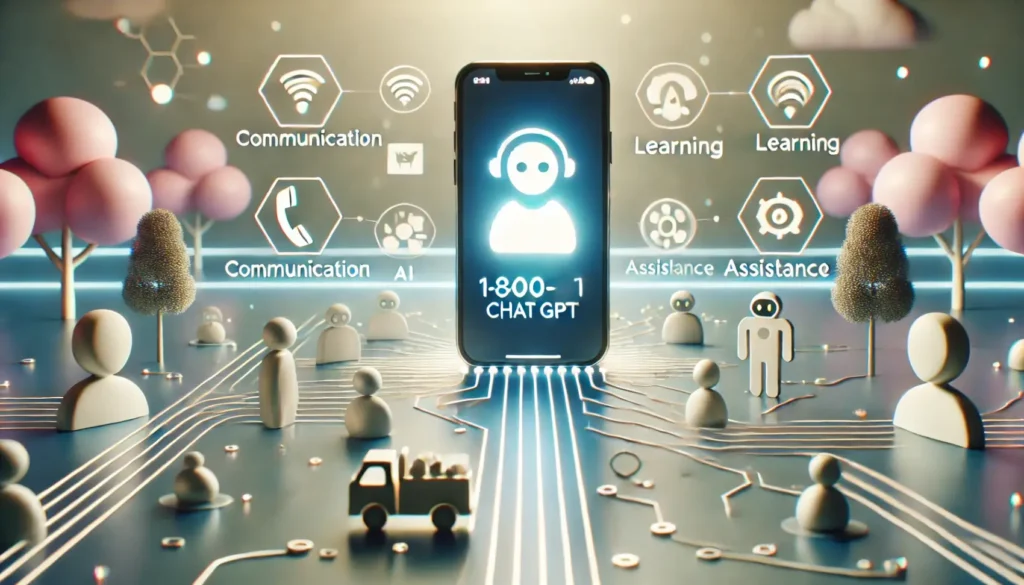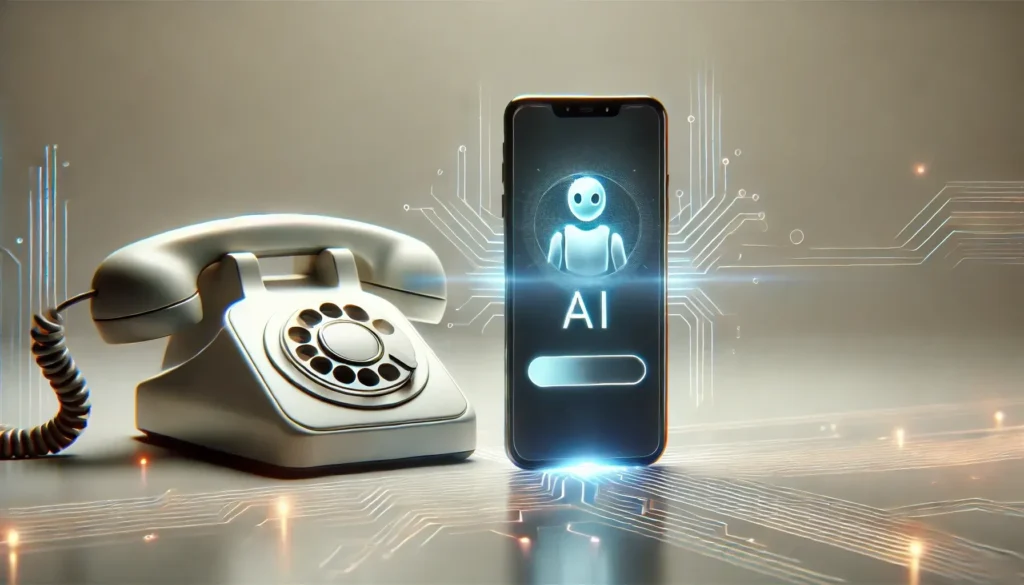Now, you can access ChatGPT on your phone just by calling a toll-free number. Yes, you heard it right! You just need to call and can access ChatGPT without internet or cellular data. This feature enables users to connect with ChatGPT conveniently, even in areas without internet access.
OpenAI introduces 1-800-CHATGPT service
OpenAI introduces a toll-free number 1-800-CHATGPT, which you can call to connect with ChatGPT over the phone. You can now call and engage in natural conversations without relying on an internet connection. Users can also message on WhatsApp to use the services of ChatGPT.
How can you call ChatGPT?
You can now interact with ChatGPT directly over the phone or through WhatsApp. This feature allows access to ChatGPT’s conversational abilities without needing an internet connection.
- Toll-Free Calling: Call ChatGPT by dialing 1-800-CHATGPT on your phone from anywhere in the U.S. You’ll get 15 minutes of interaction per month to ask questions or receive guidance.
- WhatsApp Messaging: Start a chat with ChatGPT on WhatsApp using the number 1-800-CHATGPT. It works like a regular chatbot, offering text-based responses for your queries.
- Voice Interactions: Enjoy natural voice conversations with ChatGPT by simply calling the toll-free number. The technology mimics human-like responses, making interactions seamless and intuitive.
- Offline Access: Use this feature when traveling through areas with limited or no internet connectivity. This ensures uninterrupted communication for learning or problem-solving needs.
- Accessible for All: The service works on any phone, including older models like flip or rotary phones. This flexibility expands its availability to users with varying types of devices.
- Free to Use: The first 15 minutes of calls each month are free for users in supported regions. Additional usage options may require logging into the app or website for extended access.
Comparison with GOOG-411 service
Google’s GOOG-411 service, launched in 2007, offered directory assistance powered by voice recognition. Its primary goal was collecting diverse voice samples to improve speech models. Unlike this, OpenAI’s 1-800-CHATGPT focuses on delivering direct AI assistance to users through a phone line.
While GOOG-411 aimed to refine internal technology, 1-800-CHATGPT extends accessibility to areas with limited connectivity. OpenAI provides conversational AI services without internet dependency. This positions the service as an advancement in accessibility-driven AI solutions.
By integrating older communication methods, OpenAI reflects its mission to broaden AI usage channels. Users benefit from AI assistance through phone calls or text-based interactions on WhatsApp. These steps showcase the evolving role of AI in addressing varied communication preferences.
What are the potential use cases of 1-800-CHATGPT?

ChatGPT’s phone accessibility ensures assistance when you’re without an internet connection. This feature is especially useful for road trips or remote locations, where cellular signals are weak. It allows you to rely on a familiar and practical communication method for quick answers.
Quick answers while traveling:
Ask questions or get facts during commutes or trips, enhancing your learning on the go. You can inquire about landmarks or get quick translations without stopping to search online. This option ensures you’re always informed, even in unfamiliar areas.
Easy access for everyone:
Even without tech expertise, users can easily access ChatGPT with a simple phone call. It eliminates the need for app downloads or complex account setups. This ensures a broader range of people can interact with ChatGPT effortlessly.
Practical assistance in emergency situations:
Get helpful information in situations where internet-based tools might fail or aren’t accessible. Whether you need advice, translation, or clarification, ChatGPT provides timely support through a simple phone line. This ensures a dependable resource during crucial moments.
Real-time conversations without distractions:
Enjoy natural, voice-based interaction with ChatGPT for real-time conversational answers and advice. Its friendly tone and easy responses make the process intuitive and engaging. This provides a more personal and hands-free way to obtain insights.
Learning made convenient:
Improve your knowledge by asking questions about various topics through an intuitive phone-based experience. Whether exploring history, languages, or practical subjects, ChatGPT enriches your understanding on demand. This creates an enjoyable learning process that fits into your schedule.
What are the limitations?
ChatGPT’s new phone feature offers exciting ways to access AI on the go. However, it comes with certain limits designed to manage its usage efficiently. These restrictions are essential for ensuring a fair experience for all users.
Monthly call limit:
With ChatGPT calls, you can enjoy up to 15 free minutes every month. This limit allows brief yet meaningful interactions without overloading the system. Plan your queries thoughtfully to make the most of your allocated time.
Daily messaging cap on WhatsApp:
WhatsApp users can message ChatGPT daily, within a set limit for conversations. This restriction helps ensure availability across the user base, maintaining service quality. If you hit the cap, explore ChatGPT’s app for uninterrupted access.
Doesn’t support image uploads:
ChatGPT via phone or WhatsApp doesn’t support image uploads for detailed queries. This feature is reserved for app or web users who need visual-based assistance. Use text-based prompts to maximize your engagement during calls or chats.
No web search capabilities:
Real-time web search is unavailable through ChatGPT’s phone and WhatsApp services. This limitation simplifies interactions, focusing on general conversational AI capabilities. For deeper research, explore SearchGPT on the app or web platform.
No customization options:
Phone and WhatsApp interactions don’t include personalized settings or memory-based responses. These advanced features are exclusive to logged-in users accessing ChatGPT online. Stick to concise questions for a smoother experience in this streamlined version.
Geographical and device constraints:
ChatGPT’s phone feature and WhatsApp messaging are not universally accessible yet. Users must consider regional and device-based limits when trying these services. Despite constraints, they offer substantial convenience for those who qualify.
US only access for phone calls:
Phone-based interactions are currently restricted to users within the United States. This regional limitation ensures a stable rollout of services in one market. International users can explore WhatsApp messaging as a viable alternative.
No Support for group chats:
You cannot add ChatGPT to group chats, even through the WhatsApp feature. This restriction keeps the AI focused on individual conversations for clarity and depth. Use private chats to maintain seamless and relevant discussions.
Compatibility with basic devices:
ChatGPT calls work with various devices, including flip phones and landlines. This compatibility ensures accessibility even without smartphones or advanced internet setups. Users can enjoy AI conversations regardless of their tech preferences.
Important policies for user privacy
OpenAI ensures your interaction with 1-800-CHATGPT remains private and transparent. This includes clear privacy policies on data retention and user control over stored information.
- No Model Training: Your calls and messages will not contribute to training OpenAI models. This ensures that your input remains separate from ongoing AI development.
- Limited Retention: Conversations are temporarily stored for safety and misuse prevention, adhering to strict privacy standards.
- Data Export: You can request an export of your stored data for personal records. Instructions are provided to ensure the process is simple and accessible.
- Deletion Requests: OpenAI allows you to delete your stored interactions, maintaining full control over your privacy.
- Abuse Prevention: Temporary storage helps monitor and prevent any violations or misuse of the service. This ensures a secure environment for all users.
- Transparency Standards: OpenAI shares guidelines openly, making users aware of how their data is managed.
What’s Next for ChatGPT Accessibility?
OpenAI plans to introduce agentic tasks, web browsing, and multimedia interaction to ChatGPT’s toolkit. These features could automate processes, offer real-time web-based responses, and include multimedia feedback. This progression reflects the company’s dedication to improving user engagement across multiple channels.
Expanding ChatGPT phone access worldwide could enhance its usability and integration into everyday lives. OpenAI’s focus on compatibility with platforms like WhatsApp shows their intent to bridge accessibility gaps. Broader adoption may depend on addressing user needs and refining localized support.
The introduction of 1-800-CHATGPT enhances ChatGPT’s accessibility for users in varied scenarios. Complementing tools like Siri integration and web apps, it aims to simplify your interaction with AI. These innovations pave the way for a more connected and practical user experience.
